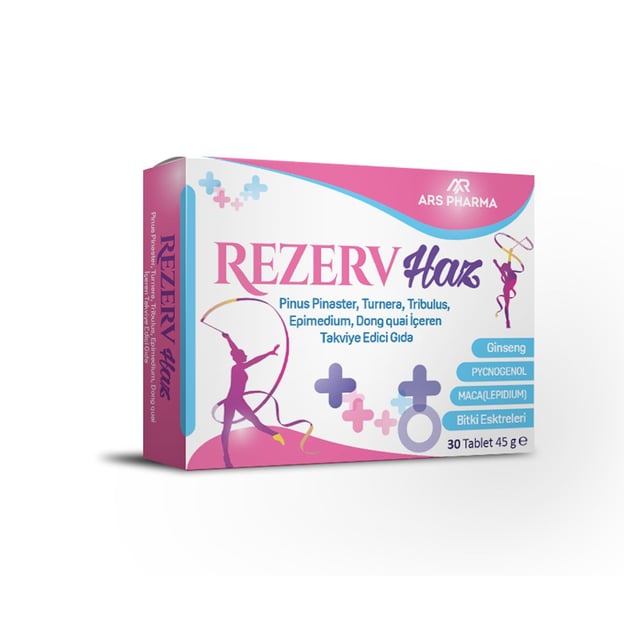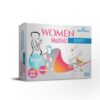Tribulus terrestris:
- Used to support dehydroepiandrosterone (DHEA) levels, significantly enhancing sexual function scores in premenopausal and postmenopausal women.
- Causes significant increases in serum estradiol and testosterone levels in premenopausal women, supporting increased libido in both men and women.
- May increase sperm production, spermatogenesis, and ovulation.
- Used to help treat pain associated with dysmenorrhea and myoma.
- Helps regulate oligomenorrhea.
- Supports improvements in the histological features of the ovaries and uterus in patients with polycystic ovary syndrome (PCOS) and helps the normal function of healthy ovaries.
- Shows efficacy in improving ovarian and breast cancers.
- Helps significantly increase corpus luteum, follicle diameters, and the theca interna, supporting other ovarian diseases such as PCOS and endometriosis, as well as postmenopausal conditions.
- Helps reduce symptoms of postmenopausal syndrome.
MACA (Lepidium meyenii):
- Helps increase libido and sexual function in women.
- Reduces postmenopausal symptoms, anxiety, mood disorders, and depression.
- Effective in reducing sexual dysfunction in postmenopausal women independent of estrogenic and androgenic activity.
- Thought to help regulate hormonal balance in cases of estrogen and progesterone imbalance, thus improving women’s sexual health.
- Assists in improving egg quality through its effect on hormonal imbalances.
- Helps reduce postmenopausal hot flashes and night sweats.
- Used as a supportive treatment for cardiovascular diseases and hypertension due to its antioxidant effects.
Pinus pinaster (PYCNOGENOL):
- Found to be particularly effective in improving postmenopausal vasomotor and insomnia/sleep problems.
- Helps improve sexual arousal response by supporting increased blood flow.
- Effective for vasomotor symptoms in perimenopausal or postmenopausal women.
- Provides protection against cardiovascular diseases.
- Exhibits antioxidant and anti-inflammatory effects.
- Helps improve glycemic control and complications in diabetic patients.
- Used as supportive therapy for dysmenorrhea, muscle, and cramp pains.
- Shows efficacy in regulating sperm morphology and function.
- Helps improve sperm quality.
- Supports increased testosterone levels and sexual activity.
- Used as supportive therapy for endometriosis treatment alongside gonadotropin-releasing hormone agonists.
- Helps significantly reduce the required amount of analgesic drugs for dysmenorrhea pain. Has antispasmodic effects.
Turnera diffusa (DAMIANA):
- Used as an aphrodisiac by both men and women.
- Helps treat erectile dysfunction in men.
- Helps improve sexual desire in women over 40 by slowing the enzyme that converts testosterone to estrogen, reducing vaginal dryness, and improving clitoral sensitivity.
- Helps women achieve more frequent orgasms and supports increasing orgasm frequency.
- Helps reduce symptoms of anxiety and depression.
Dong quai (Angelica sinensis):
- Exhibits aphrodisiac effects by binding to estrogen receptors.
- Supports normal menstrual flow and treatment of dysmenorrhea (painful periods).
- Assists in the treatment of premenstrual syndrome (PMS).
- Supports reducing menopausal symptoms due to its phytoestrogenic content and estrogenic activity.
L-arginine:
- Helps improve sexual desire, vaginal dryness, frequency of intercourse, and orgasm frequency.
- Improves clitoral sensitivity in women.
- Supports significant improvements in sexual satisfaction and vaginal dryness in perimenopausal women.
- Supports the treatment of erectile dysfunction in men.
Panax ginseng:
- Helps improve sexual functionality scores.
- Has significant effects in improving quality of life and alleviating menopausal symptoms.
- Supports reducing postmenopausal symptoms through its phytoestrogenic effects.
- Supports improved sexual function and orgasm by modulating nitric oxide.
Ginkgo biloba:
- Supports improving blood flow and nitric oxide system, helping to increase sexual desire.
- Used as supportive therapy for sexual dysfunction caused by anxiety disorders.
- Helps treat both physical and psychological symptoms of premenstrual syndrome (PMS).
- Supports the treatment of low libido.
- Helps increase sexual desire and satisfaction in women undergoing sexual psychotherapy training.
Ferula hermonis:
- Supports increasing estrogenic activity due to its follicle-stimulating hormone (FSH) and luteinizing hormone (LH) like activities, making it phytoestrogenic.
- Supports the treatment of sexual dysfunction in women, which is often associated with decreased estrogenic hormone levels.
- Helps reduce vasomotor symptoms in postmenopausal women.
- Used as supportive therapy for preventing osteoporosis.
- Helps increase fertility.
Epimedium (Icariin):
- Has aphrodisiac properties and is phytoestrogenic.
- Helps increase blood flow to sexual organs in both men and women, supporting increased sexual desire.
- Used as supportive therapy for menstrual cycle problems.
- Beneficial for those with hormonal imbalances causing postmenopausal symptoms like hot flashes and vaginal dryness.
- Used as supportive therapy to prevent bone loss in postmenopausal women.
- Supports reducing total cholesterol and triglyceride levels in postmenopausal women.
- Supports delaying cellular aging.
- Supports regulating the immune system.
Caffeine:
- Increases estrogenic hormones. Supports improved sexual function due to increased hormonal levels and its energizing effect.
- Has aromatase inhibitor effects, which can be supportive in treating women diagnosed with polycystic ovary syndrome (PCOS).
- Stimulates the central nervous system to reduce fatigue and drowsiness.
- May enhance exercise performance and improve endurance and muscle strength.
- Helps treat reduced anxiety and depression.
Glycyrrhiza glabra (Licorice root):
- Is phytoestrogenic.
- Helps reduce the frequency, duration, and severity of hot flashes in postmenopausal women.
- Helps reduce vaginal dryness and dyspareunia, supporting the natural vaginal flora in postmenopausal women.
 0536 997 02 57
0536 997 02 57
 Türkçe
Türkçe










